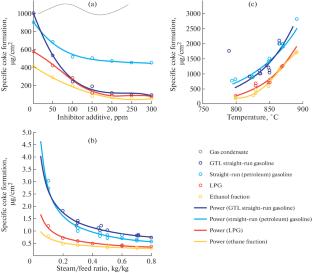使用抑制剂评估蒸汽裂解过程中焦炭形成的动力学指标
IF 0.8
4区 工程技术
Q4 CHEMISTRY, MULTIDISCIPLINARY
引用次数: 0
摘要
摘要 研究了使用以下抑制剂减少碳氢化合物原料蒸汽裂解过程中焦炭形成的情况:二甲基二硫(DMDS)、二甲基硫醚(DMS)和二甲基亚砜(DMSO)。确定了各种因素对焦炭形成的影响:抑制剂用量(0-300 ppm)、工艺温度(750-600°C)和水蒸气/原料比(0-1 kg/kg)。计算了减少焦炭形成过程的动力学参数。本文章由计算机程序翻译,如有差异,请以英文原文为准。

Assessment of Kinetic Indicators of Coke Formation in the Course of Steam Cracking with the Use of Inhibitors
The decrease of coke formation in the steam cracking of hydrocarbon raw materials was studied with the use of the following inhibitors: dimethyl disulfide (DMDS), dimethyl sulfide (DMS), and dimethyl sulfoxide (DMSO). The influence of various factors on coke formation has been established: the amount of inhibitor (0–300 ppm), process temperature (750–600°C) and the water vapor/raw material ratio (0–1 kg/kg). The kinetic parameters of the process of reducing coke formation have been calculated.
求助全文
通过发布文献求助,成功后即可免费获取论文全文。
去求助
来源期刊

Solid Fuel Chemistry
CHEMISTRY, MULTIDISCIPLINARY-ENERGY & FUELS
CiteScore
1.10
自引率
28.60%
发文量
52
审稿时长
6-12 weeks
期刊介绍:
The journal publishes theoretical and applied articles on the chemistry and physics of solid fuels and carbonaceous materials. It addresses the composition, structure, and properties of solid fuels. The aim of the published articles is to demonstrate how novel discoveries, developments, and theories may be used in improved analysis and design of new types of fuels, chemicals, and by-products. The journal is particularly concerned with technological aspects of various chemical conversion processes and includes papers related to geochemistry, petrology and systematization of fossil fuels, their beneficiation and preparation for processing, the processes themselves, and the ultimate recovery of the liquid or gaseous end products.
 求助内容:
求助内容: 应助结果提醒方式:
应助结果提醒方式:


